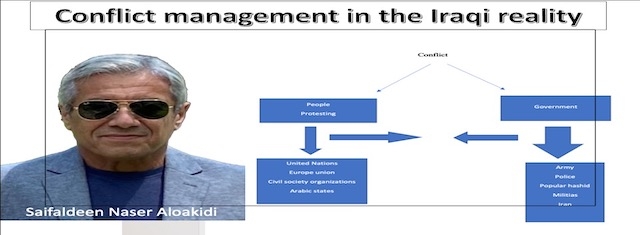Politics
Conflict management in the Iraqi reality
MidIdle east

Saifaldeen Naser Aloakidi
USPA NEWS -
The Iraqi reality, especially after the occupation, suffers from a complex and continuous conflict crisis, characterized by the lack of peace opportunities and the unwillingness of the conflicting forces to plan solutions and preventive prevention strategies. For the Iraqi opposition in the year 2002, which was the first launch in a conflicting space whose settlement was not reached except by accepting the quotas, which is one of the solutions strategies and called the strategy of sharing power and influence, so what was and became our president is Kurdish, our legislative authority is Sunni, and our prime minister is Shiite.
Although the conflict is considered a positive interaction because it leads to the achievement of objectives, but not addressing its roots leads to the deepening and consolidation of its causes gradually, until it makes its settlement impossible except by dividing the conflicting teams and isolating them, as happened in many countries of the Federal Republic of Yugoslavia.
The political class, which was one of the outcomes of the process of overthrowing the previous regime, is a conflicting, inconsistent, and essentially divided class into a Tropical that declares itself without fear or shame. The local actor (the third party) who draws the strategy for settling the conflict and stands idly by in most cases, either in response to external pressures or to preserve the spoils, even though a word from him in many cases would have led to stopping the bloodshed and the destruction of property, waste and possession.
The political class, which was one of the outcomes of the process of overthrowing the previous regime, is a conflicting, inconsistent, and essentially divided class into a Tropical that declares itself without fear or shame. The local actor (the third party) who draws the strategy for settling the conflict and stands idly by in most cases, either in response to external pressures or to preserve the spoils, even though a word from him in many cases would have led to stopping the bloodshed and the destruction of property, waste and possession.
Conflict is a human necessity for the events of change and reform, as mentioned by the sociologist Konica Wright. An acceptable and natural trait if it is emotional and abstract. When the sectarian is proud of his belonging and engages in practices that reinforce that belonging, it does not affect the society, but if sectarianism turns into a sectarian behavior followed by a component in order to make all the privileges pour into a trench it turns into a struggle for existence and a struggle against discrimination. What Iraq suffers from today It is an openly raging conflict in the societal roof and the political class, and the infection of this conflict has spread to the society, which has become suffering from another form of it with a hidden nature, and the evidence for this is what happens after every election, the constituent retrenchment of voters, and the absence of the national identity that is disrupted and numbed throughout the election period and is revitalized sham after the results appear.
So, you hear everyone calling for the homeland and national unity, and a few weeks ago, he was advocating the doctrine and the component, and no matter how much he reached the sentences, phrases, and slogans reached their eloquence in brotherhood and a common destiny, but all these streaks fall when the beneficiary faces any mass activity that calls for correction, change and the renewal of the controlling actors, warning her against going to the rule of others. Everyone that cancels them and we. The four roots of the conflict, which are power, influence, discrimination, rights and identity, are rooted in reality, and we have not reached settlements until today. Wherever you find, governments are formed according to the terms of a national unity government, a majority government, or a national consensus government.
So, know, sir, that you are in the heart of the conflict. These words are nothing but a transfer to the settlement, so do not bury your head in the sand dreams of good governance and a stable country. If Iraq was a stable country, there would be no need for a representative of the Secretary-General of the United Nations, whose presence is limited to unstable countries that suffer from crises and conflicts that erupt at any moment. Liberation through comprehensive change that will not be successful if it does not start in your mind, your behavior, and your pride in the unified identity of Iraq.
Liability for this article lies with the author, who also holds the copyright. Editorial content from USPA may be quoted on other websites as long as the quote comprises no more than 5% of the entire text, is marked as such and the source is named (via hyperlink).





